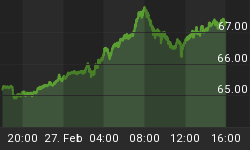Does the Current Market Volatility Signal A Trend Change in Sentiment?

31 Minutes, 49 Slides
Gordon T Long poses three questions for debate with John Rubino regarding the current Geo-Political Event Risks and Macro Economics developments:
-
Are the risks in fact bigger and more serious problems than we were seeing while the market was going up?
-
Could it actually be a matter that investors are reacting differently because underlying mood / sentiment has changed for some reason?
-
Are we unknowingly now over focusing on the Geo-Political Event Risks and Macro Economics developments as a result of the market going down (maybe for other reasons like reduced liquidity flows that no one is presently talking about - yet)?
John steps the discussion through risks such as: 1-the Islamic State, 2- Ebola, 3- The Strong $$$, 4- Japan & Europe, 5- Junk Bonds and 6- The"October" problem to illustrate that though the problems are more serious the real shift is in perceptions. He suggests that a phase shift occurs when "new headlines suddenly begin to seem both oppressive and really, really numerous, the public starts to feel that maybe we're not okay after all!"

John suggests that the public is justified in being both confused and nervous because of the degree of market manipulation going on which has distorted price discovery, the pricing of risk and has allowed malinvestment to be hidden by continued roll-overs of every increasing levels of debt. He feels it will end, but it is impossible to know when - just that it will.
Gordon points out that the Federal Reserve still has more ammunition ready to go. He illustrates this with the recent derivatives contract signed between the Fed and the US option exchanges and well as the $300B Reverse Repo account "locked and loaded" in anticipation of any market correction that might ignite a potential cascading collateral collapse. This has the potential to change sentiment from fear to greed once the much needed bond rotation is complete.
Additionally, Gordon feels that though the central bankers are no doubt nervous they have not reached the dangerous point where they panic and pull out all the stops to protect the implosion of an over indebted and financially repressed system.

With the aid of 49 slides, this 31 minute video covers a lot of ground in an easy to follow dialogue.
The FINANCIAL REPRESSION AUTHORITY™















